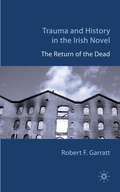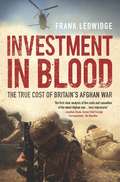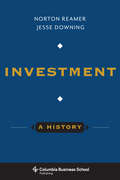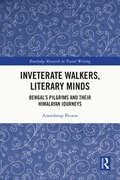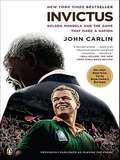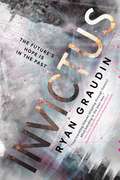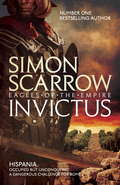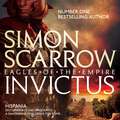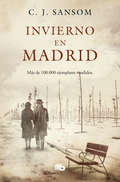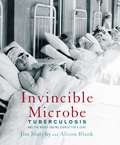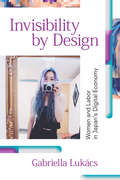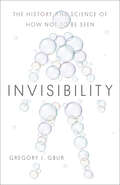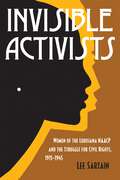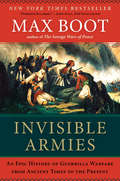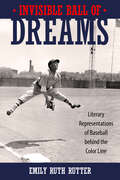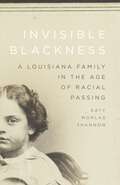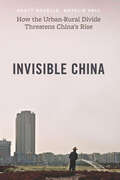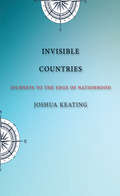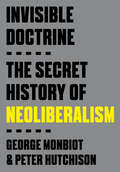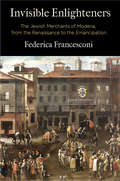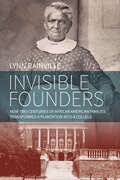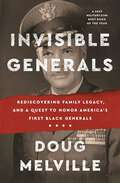- Table View
- List View
Investment Incentives and the Global Competition for Capital: The Return Of The Dead (International Political Economy Series)
by Kenneth P. ThomasThis book considers the widespread treatment of traumatic memory in Irish fiction of the past thirty-five years. It focuses on both trauma fiction and the historical novel, and the way certain novelists looked to early events in twentieth century Irish history to engage the recent political violence in Northern Ireland beginning in 1969.
Investment in Blood
by Frank LedwidgeIn this follow-up to his much-praised book "Losing Small Wars: British Military Failure in Iraq and Afghanistan," Frank Ledwidge argues that Britain has paid a heavy cost - both financially and in human terms - for its involvement in the Afghanistan war. Ledwidge calculates the high price paid by British soldiers and their families, taxpayers in the United Kingdom, and, most importantly, Afghan citizens, highlighting the thousands of deaths and injuries, the enormous amount of money spent bolstering a corrupt Afghan government, and the long-term damage done to the British militarys international reputation. In this hard-hitting expose, based on interviews, rigorous on-the-ground research, and official information obtained through the Freedom of Information Act, Ledwidge demonstrates the folly of Britains extended participation in an unwinnable war. Arguing that the only true beneficiaries of the conflict are development consultants, international arms dealers, and Afghan drug kingpins, he provides a powerful, eye-opening, and often heartbreaking account of military adventurism gone horribly wrong.
Investment: A History (Columbia Business School Publishing)
by Norton Reamer Jesse DowningInvesting—the commitment of resources to achieve a return—affects individuals, families, companies, and nations, and has done so throughout history. Yet until the sixteenth century, investing was a privilege of only the elite classes. The story behind the democratization of investing is bound up with some of history's most epic events. It is also a tale rich with lessons for professional and everyday investors who hope to make wiser choices.This entertaining history doubles as a sophisticated account of the opportunities and challenges facing the modern investor. It follows the rise of funded retirement; the evolution of investment vehicles and techniques; investment misdeeds and regulatory reform; government economic policy; the development of investment theory; and the emergence of new investment structures. Norton Reamer and Jesse Downing map these trends and profile the battle between low cost index and exchange-traded funds, on the one hand, and the higher-fee hedge funds and private equity, on the other. By helping us understand this history and its legacy of risk, Reamer and Downing hope to better educate readers about the individual and societal impact of investing and ultimately level the playing field.
Inveterate Walkers, Literary Minds: Bengal’s Pilgrims and Their Himalayan Journeys (Routledge Research in Travel Writing)
by Anandarup BiswasInveterate Walkers, Literary Minds: Bengal’s Pilgrims and Their Himalayan Journeys brings under its critical focus the writings of Bengal’s travellers (mostly pilgrims) who went, on foot, into Himalayan trails from the mid-nineteenth to the early and mid-twentieth century. Unlike many European travellers and climbers in the age of empire, who saw the mountain as an obstacle overcoming which was a matter of individual and national pride, these modest walkers, unkempt and raddled in their meagre ways of travel, produced a discourse of surrender in their intimate and reflecting engagement with the mountains. The book examines the writings of Jadunath Sharbadhikary, the first among Bengal’s pilgrims whose Himalayan travels were published as a book and the more popular writers including Jaladhar Sen, Umaprasad Mukhopadhyay and Abadhut. It also traces emergent selfhoods and complex subjectivities of women travellers in particular, such as Ratnamala Devi, Rani Chanda and Nabaneeta Deb Sen whose accounts reveal both guarded, hesitant voices and self-assured, confident enunciation of the self.
Invictus
by John CarlinBeginning in a jail cell and ending in a rugby tournament—the true story of how the most inspiring charm offensive in history brought South Africa together. After being released from prison and winning South Africa’s first free election, Nelson Mandela presided over a country still deeply divided by fifty years of apartheid. His plan was ambitious if not far-fetched: use the national rugby team, the Springboks—long an embodiment of white-supremacist rule—to embody and engage a new South Africa as they prepared to host the 1995 World Cup. The string of wins that followed not only defied the odds, but capped Mandela’s miraculous effort to bring South Africans together again in a hard-won, enduring bond. Watch a Video .
Invictus
by Ryan Graudin<p>A heart-stopping adventure that defies time and space--New York Times bestselling author Marie Lu calls it "an incredibly intricate, brilliantly paced, masterfully written journey." <p>Farway Gaius McCarthy was born outside of time. The son of a time traveler from 2354 AD and a gladiator living in ancient Rome, Far's very existence defies the laws of nature. All he's ever wanted was to explore history for himself, but after failing his entrance exam into the government program, Far will have to settle for a position on the black market-captaining a time-traveling crew to steal valuables from the past. <p>During a routine heist on the sinking Titanic, Far meets a mysterious girl named Eliot who always seems to be one step ahead of him. Eliot has secrets-big ones-that will affect Far's life from beginning to end. Armed with the knowledge that history is not as steady as it seems, she will lead Far and his team on a race through time to set things right before the clock runs out.</p>
Invictus (Eagles Of The Empire Ser. #Bk. 15)
by Simon ScarrowINVICTUS is a gripping, authentic and exciting novel of the Roman army from bestselling author Simon Scarrow. Not to be missed by readers of Conn Iggulden and Bernard Cornwell.It is AD 54. The soldiers of the Roman army patrol a growing Empire, from the Mediterranean to the North Sea, from the Atlantic to the banks of the Nile. Rome brutally enforces its rule, and its legions are the most efficient and aggressive fighting force in the world. Two battle-scarred veterans of this army, Prefect Cato and Centurion Macro, have survived years of campaigning in Britannia and have been recalled to Rome. Their time in the teeming, dangerously political city is short, and soon they are travelling with the Praetorian Guard to Spain, a restless colony where simmering tension in the face of Roman rule is aggravated by bitter rivalry amongst the natives. The challenges that face two old friends and their comrades in arms are unlike any they have seen before - in a land that declares itself unconquerable...
Invictus (Eagles Of The Empire Ser. #Bk. 15)
by Simon ScarrowIF YOU DON'T KNOW SIMON SCARROW, YOU DON'T KNOW ROME!The Sunday Times bestseller. INVICTUS is a gripping, authentic and exciting novel of the Roman army from bestselling author Simon Scarrow. Not to be missed by readers of Conn Iggulden and Bernard Cornwell.It is AD 54. The soldiers of the Roman army patrol a growing Empire, from the Mediterranean to the North Sea, from the Atlantic to the banks of the Nile. Rome brutally enforces its rule, and its legions are the most efficient and aggressive fighting force in the world. Two battle-scarred veterans of this army, Prefect Cato and Centurion Macro, have survived years of campaigning in Britannia and have been recalled to Rome. Their time in the teeming, dangerously political city is short, and soon they are travelling with the Praetorian Guard to Spain, a restless colony where simmering tension in the face of Roman rule is aggravated by bitter rivalry amongst the natives. The challenges that face two old friends and their comrades in arms are unlike any they have seen before - in a land that declares itself unconquerable...
Invictus (Eagles of the Empire 15)
by Simon ScarrowThe gripping new Roman adventure in the EAGLES OF THE EMPIRE series, featuring Cato and Macro, from No.1 Sunday Times bestselling Simon Scarrow, author of BRITANNIA and BROTHERS IN BLOOD. 'I really don't need this kind of competition' Bernard Cornwell
Invictus: Nelson Mandela and the Game That Made a Nation
by John CarlinSoon to be a major motion picture, directed by Clint Eastwood and starring Matt Damon and Morgan Freeman, "Invictus" tells the story of Nelson Mandela's ambitious plan to use South Africa's national rugby team to engage the still deeply divided country.
Invierno en Madrid
by C.J. SansomInolvidable, irresistible e imprescindible, Invierno en Madrid es una novela de amor y espionaje que trata sobre la dificultad de elegir bien en un momento marcado por la guerra. Año 1940. Europa está en manos de los nazis. En plena posguerra, Madrid pasa hambre y se ha convertido en un hervidero de espías de todas las potencias mundiales. Harry Brett, un antiguo soldado inglés que participó en la guerra civil y trabaja para el servicio secreto británico, debe ganarse la confianza de un antiguo condiscípulo, Sandy Forsyth, a fin de averiguar a qué negocios turbios se dedica en la España de Franco. Mientras tanto, Barbara Clare, la novia de Sandy, ex enfermera de la Cruz Roja, también tiene una misión secreta: encontrar al que fue su amante, Bernie Piper, un voluntario comunista de las Brigadas Internacionales que despareció tras la Batalla del Jarama. Inolvidable, irresistible e imprescindible, Invierno en Madrid es una novela de amor y espionaje que trata sobre la dificultad de elegir bien en un momento marcado por la guerra. Año 1940. Europa está en manos de los nazis. En plena posguerra, Madrid pasa hambre y se ha convertido en un hervidero de espías de todas las potencias mundiales. Harry Brett, un antiguo soldado inglés que participó en la guerra civil y trabaja para el servicio secreto británico, debe ganarse la confianza de un antiguo condiscípulo, Sandy Forsyth, a fin de averiguar a qué negocios turbios se dedica en la España de Franco. Mientras tanto, Barbara Clare, la novia de Sandy, ex enfermera de la Cruz Roja, también tiene una misión secreta: encontrar al que fue su amante, Bernie Piper, un voluntario comunista de las Brigadas Internacionales que despareció tras la Batalla del Jarama.
Invincible Microbe: Tuberculosis and the Never-Ending Search for a Cure
by Jim Murphy Alison BlankThis is the story of a killer that has been striking people down for thousands of years:tuberculosis. After centuries of ineffective treatments, the microorganism that causesTB was identified, and the cure was thought to be within reach--but drug-resistantvarieties continue to plague and panic the human race. The "biography" of this deadlygerm, an account of the diagnosis, treatment, and "cure" of the disease over time,and the social history of an illness that could strike anywhere but was most prevalentamong the poor are woven together in an engrossing, carefully researched narrative.Bibliography, source notes, index.
Invisibility by Design: Women and Labor in Japan's Digital Economy
by Gabriella LukácsIn the wake of labor market deregulation during the 2000s, online content sharing and social networking platforms were promoted in Japan as new sites of work that were accessible to anyone. Enticed by the chance to build personally fulfilling careers, many young women entered Japan's digital economy by performing unpaid labor as photographers, net idols, bloggers, online traders, and cell phone novelists. While some women leveraged digital technology to create successful careers, most did not. In Invisibility by Design Gabriella Lukács traces how these women's unpaid labor became the engine of Japan's digital economy. Drawing on interviews with young women who strove to sculpt careers in the digital economy, Lukács shows how platform owners tapped unpaid labor to create innovative profit-generating practices without employing workers, thereby rendering women's labor invisible. By drawing out the ways in which labor precarity generates a demand for feminized affective labor, Lukács underscores the fallacy of the digital economy as a more democratic, egalitarian, and inclusive mode of production.
Invisibility: The History and Science of How Not to Be Seen
by Gregory J. GburA lively exploration of how invisibility has gone from science fiction to fact Is it possible for something or someone to be made invisible? This question, which has intrigued authors of science fiction for over a century, has become a headline-grabbing topic of scientific research. In this book, science writer and optical physicist Gregory J. Gbur traces the science of invisibility from its sci-fi origins in the nineteenth-century writings of authors such as H. G. Wells and Fitz James O&’Brien to modern stealth technology, invisibility cloaks, and metamaterials. He explores the history of invisibility and its science and technology connections, including the discovery of the electromagnetic spectrum, the development of the atomic model, and quantum theory. He shows how invisibility has moved from fiction to reality, and he questions the hidden paths that lie ahead for researchers. This is not only the story of invisibility but also the story of humankind&’s understanding of the nature of light itself, and of the many fascinating figures whose discoveries advanced this knowledge.
Invisible Activists: Women of the Louisiana NAACP and the Struggle for Civil Rights, 1915–1945 (Conflicting Worlds: New Dimensions of the American Civil War)
by Lee SartainBehind the historical accounts of the great men of the National Association for the Advancement of Colored People lies the almost forgotten story of the black women who not only participated in the organization but actually helped it thrive in the early twentieth-century South. In Invisible Activists, Lee Sartain examines attitudes toward the gender, class, and citizenship of African American activists in Louisiana and women’s roles in the campaign for civil rights in the state. In the end, he argues, it was the women working behind the scenes in Louisiana’s branches of the NAACP who were the most crucial factor in the organization’s efficiency and survival.During the first half of the twentieth century—especially in the darkest days of the Great Depression, when membership waned and funds were scarce—a core group of women maintained Louisiana's NAACP. Fighting on the front line, Sartain explains, women acted as grassroots organizers, running public relations campaigns and membership drives, mobilizing youth groups, and promoting general community involvement. Using case studies of several prominent female NAACP members in Louisiana, Sartain demonstrates how women combined their fundraising skills with an extensive network of community and family ties to fund the NAACP and, increasingly, to undertake the day-to-day operations of the local organizations themselves.Still, these women also struggled against the double obstacles of racism and sexism that prevented them from attaining the highest positions within NAACP branch leadership. Sartain illustrates how the differences between the sexes were ultimately woven into the political battle for racial justice, where women were viewed as having inherent moral superiority and, hence, the potential to lift the black population as a whole. Sartain concludes that despite the societal traditions that kept women out of leadership positions, in the early stages of the civil rights movement, their skills and their contributions as community matriarchs provided the keys to the organization’s progress.Highly original and essential to a comprehensive study of the NAACP, Invisible Activists gives voice to the many individual women who sustained the influential civil rights organization during a time of severe racial oppression in Louisiana. Without such dedication, Sartain asserts, the organization would have had no substantial presence in the state.
Invisible Armies: An Epic History of Guerrilla Warfare from Ancient Times to the Present
by Max Boot"Destined to be the classic account of what may be the oldest . . . hardest form of war."--John Nagl, Wall Street Journal Invisible Armies presents an entirely original narrative of warfare, which demonstrates that, far from the exception, loosely organized partisan or guerrilla warfare has been the dominant form of military conflict throughout history. New York Times best-selling author and military historian Max Boot traces guerrilla warfare and terrorism from antiquity to the present, narrating nearly thirty centuries of unconventional military conflicts. Filled with dramatic analysis of strategy and tactics, as well as many memorable characters--from Italian nationalist Guiseppe Garibaldi to the "Quiet American," Edward Lansdale--Invisible Armies is "as readable as a novel" (Michael Korda, Daily Beast) and "a timely reminder to politicians and generals of the hard-earned lessons of history" (Economist).
Invisible Ball of Dreams: Literary Representations of Baseball behind the Color Line
by Emily Ruth RutterWinner of the 2018 John Coates Next Generation Award from the Negro Leagues Research Committee of the Society for American Baseball Research Although many Americans think of Jackie Robinson when considering the story of segregation in baseball, a long history of tragedies and triumphs precede Robinson’s momentous debut with the Brooklyn Dodgers. From the pioneering Cuban Giants (1885-1915) to the Negro Leagues (1920-1960), Black baseball was a long-standing staple of African American communities. While many of its artifacts and statistics are lost, Black baseball figured vibrantly in films, novels, plays, and poems. In Invisible Ball of Dreams: Literary Representations of Baseball behind the Color Line, author Emily Ruth Rutter examines wide-ranging representations of this history by William Brashler, Jerome Charyn, August Wilson, Gloria Naylor, Harmony Holiday, Kevin King, Kadir Nelson, and Denzel Washington, among others. Reading representations across the literary color line, Rutter opens a propitious space for exploring Black cultural pride and residual frustrations with racial hypocrisies on the one hand and the benefits and limitations of white empathy on the other. Exploring these topics is necessary to the project of enriching the archives of segregated baseball in particular and African American cultural history more generally.
Invisible Blackness: A Louisiana Family in the Age of Racial Passing
by Katy Morlas ShannonInvisible Blackness explores the complex lives of Creoles of mixed race born in Louisiana to enslaved women and the white men who enslaved them. Individuals such as Alice Thomasson Grice forged their own identities—and often reinvented themselves—within the increasingly strict racial order of antebellum and postbellum Louisiana.Alice Thomasson Grice occupied an unusual position among mixed-race Creoles of her era, as her white father recognized her formerly enslaved mother as his wife and raised Alice and her siblings as free people. After Alice married a white steamboat captain, Charles Grice, she and her children chose to identify as white. Invisible Blackness explores why Alice, her children, and friends in similar positions elected to cross the color line during the so-called “great age of passing” that spanned from 1880 to 1925.While it’s impossible to quantify the number of people who crossed the color line at any given time, evidence suggests that the rate of passing corresponded closely with the severity of anti-Black oppression and discrimination. By the 1890s, when the Supreme Court upheld Jim Crow laws and lynchings were on the rise, Black people who could pass had a strong motivation to do so. For the Grices, passing afforded the only means of social, economic, and political advancement available to them.Drawing on a vast array of primary sources, ranging from sacramental records and bills of sale to wills and military pension files, Invisible Blackness sheds light on how this liminal group of individuals defined themselves and shaped their identities. The lives of the Grices and people like them underscore that race is both a social construct and a significant lived reality. Beyond these broad, pressing historical questions lie issues of love, family, and the universal quest for belonging that transcend time, place, and race.
Invisible China: How the Urban-Rural Divide Threatens China’s Rise
by Scott Rozelle Natalie HellAs the glittering skyline in Shanghai seemingly attests, China has quickly transformed itself from a place of stark poverty into a modern, urban, technologically savvy economic powerhouse. But as Scott Rozelle and Natalie Hell show in Invisible China, the truth is much more complicated and might be a serious cause for concern. China’s growth has relied heavily on unskilled labor. Most of the workers who have fueled the country’s rise come from rural villages and have never been to high school. While this national growth strategy has been effective for three decades, the unskilled wage rate is finally rising, inducing companies inside China to automate at an unprecedented rate and triggering an exodus of companies seeking cheaper labor in other countries. Ten years ago, almost every product for sale in an American Walmart was made in China. Today, that is no longer the case. With the changing demand for labor, China seems to have no good back-up plan. For all of its investment in physical infrastructure, for decades China failed to invest enough in its people. Recent progress may come too late. Drawing on extensive surveys on the ground in China, Rozelle and Hell reveal that while China may be the second-largest economy in the world, its labor force has one of the lowest levels of education of any comparable country. Over half of China’s population—as well as a vast majority of its children—are from rural areas. Their low levels of basic education may leave many unable to find work in the formal workplace as China’s economy changes and manufacturing jobs move elsewhere. In Invisible China, Rozelle and Hell speak not only to an urgent humanitarian concern but also a potential economic crisis that could upend economies and foreign relations around the globe. If too many are left structurally unemployable, the implications both inside and outside of China could be serious. Understanding the situation in China today is essential if we are to avoid a potential crisis of international proportions. This book is an urgent and timely call to action that should be read by economists, policymakers, the business community, and general readers alike.
Invisible Cities
by William Weaver Italo CalvinoImaginary conversations between Marco Polo and his host, the Chinese ruler Kublai Khan, conjure up cities of magical times. "Of all tasks, describing the contents of a book is the most difficult and in the case of a marvelous invention like Invisible Cities, perfectly irrelevant" (Gore Vidal). Translated by William Weaver. A Helen and Kurt Wolff Book. Unusual Table of Contents and presentation.
Invisible Countries: Journeys to the Edge of Nationhood
by Joshua KeatingA journalist explores how our world&’s borders came to be and how self-proclaimed countries across the globe could change the map. What is a country? While certain basic criteria—borders, a government, and recognition from other countries—seem obvious, journalist Joshua Keating investigates what happens in areas of the world that exist as exceptions to these rules. Invisible Countries looks at semiautonomous countries such as Abkhazia, Kurdistan, and Somaliland, as well as a Mohawk reservation straddling the U.S.-Canada border, and an island nation whose very existence is threatened by climate change. Through stories about these would-be countries&’ efforts at self-determination, Keating shows that there is no universal legal authority determining what a country is. He also argues that economic, cultural, and environmental forces could soon bring an end to our long period of cartographical stasis. Keating combines history with incisive observations drawn from his travels and interviews with residents, political leaders, and scholars in each of these &“invisible countries.&”
Invisible Doctrine: The Secret History of Neoliberalism
by George Monbiot Peter Hutchison#1 SUNDAY TIMES BESTSELLER • A &“fantastic&” (Mark Ruffalo), fiercely argued takedown of neoliberalism that not only defines this slippery concept but connects it to the climate crisis, poverty, and fascism—and shows us how to fight back.&“Incisive, illuminating, eye-opening—an unsparing anatomy of the great ideological beast stalking our times, often whispered about and yet never so clearly in view.&”—David Wallace-Wells, author of The Uninhabitable EarthNeoliberalism is the dominant ideology of our time. It shapes us in countless ways, yet most of us struggle to articulate what it is. Worse, we have been persuaded to accept this extreme creed as a kind of natural law. In Invisible Doctrine, journalist George Monbiot and filmmaker Peter Hutchison shatter this myth. They show how a fringe philosophy in the 1930s—championing competition as the defining feature of humankind—was systematically hijacked by a group of wealthy elites, determined to guard their fortunes and power. Think tanks, corporations, the media, university departments and politicians were all deployed to promote the idea that people are consumers, rather than citizens.One of the most pernicious effects has been to make our various crises—from climate disasters to economic crashes, from the degradation of public services to rampant child poverty—seem unrelated. In fact, they have all been exacerbated by the &“invisible doctrine,&” which subordinates democracy to the power of money. Monbiot and Hutchison connect the dots—and trace a direct line from neoliberalism to fascism, which preys on people&’s hopelessness and desperation.Speaking out against the fairy tale of capitalism and populist conspiracy theories, Monbiot and Hutchison lay the groundwork for a new politics, one based on truly participatory democracy and &“private sufficiency, public luxury&”: an inspiring vision that could help bring the neoliberal era to an end.
Invisible Enlighteners: The Jewish Merchants of Modena, from the Renaissance to the Emancipation (Jewish Culture and Contexts)
by Federica FrancesconiFederica Francesconi writes the history of the Jewish merchants who lived and prospered in the northern Italian city of Modena, capital city of the Este Duchy, during the seventeenth and eighteenth centuries. Her protagonists are men and women who stood out within their communities but who, despite their cultural and economic prominence, were ghettoized after 1638. Their sociocultural transformation and eventual legal and political integration evolved through a complex dialogue between their Italian and Jewish identities, and without the traumatic ruptures or dramatic divides that led to the assimilation and conversion of many Jews elsewhere in Europe.In Modena, male and female Jewish identities were contoured by both cultural developments internal to the community and engagement with the broader society. The study of Lurianic and Cordoverian Kabbalah, liturgical and nondevotional Hebrew poetry, and Sabbateanism existed alongside interactions with Jesuits, converts, and inquisitors. If Modenese Jewish merchants were absent from the public discourse of the Estes, their businesses lives were nevertheless located at the very geographical and economic center of the city. They lived in an environment that gave rise to unique forms of Renaissance culture, early modern female agency, and Enlightenment practice. New Jewish ways of performing gender emerged in the seventeenth century, giving rise to what could be called an entrepreneurial female community devoted to assisting, employing, and socializing in the ghetto. Indeed, the ghetto leadership prepared both Jewish men and women for the political and legal emancipation they would eventually obtain under Napoleon. It was the cultured Modenese merchants who combined active participation in the political struggle for Italian Jewish emancipation with the creation of a special form of the Enlightenment embedded in scholarly and French-oriented lay culture that emerged within the European context.
Invisible Founders: How Two Centuries of African American Families Transformed a Plantation into a College
by Lynn RainvilleLiteral and metaphorical excavations at Sweet Briar College reveal how African American labor enabled the transformation of Sweet Briar Plantation into a private women’s college in 1906. This volume tells the story of the invisible founders of a college founded by and for white women. Despite being built and maintained by African American families, the college did not integrate its student body for sixty years after it opened. In the process, Invisible Founders challenges our ideas of what a college “founder” is, restoring African American narratives to their deserved and central place in the story of a single institution — one that serves as a microcosm of the American South.
Invisible Generals: Rediscovering Family Legacy, and a Quest to Honor America's First Black Generals
by Doug MelvilleThis amazing true story of America&’s first Black generals, Benjamin O. Davis Sr. and Jr., a father and son who helped integrate the American military and created the Tuskegee Airmen, is &“the book Black America needs in this moment&” (Eboni K. Williams, lawyer and cohost of State of the Culture).Red Tails, George Lucas&’s celebration of America&’s first Black flying squadron, the Tuskegee Airmen, should have been a moment of victory for Doug Melville. He expected to see his great-uncle Benjamin O. Davis Jr.—the squadron&’s commander—immortalized on-screen for his selfless contributions to America. But as the film rolled, Doug was shocked when he realized that Ben Jr.&’s name had been omitted and replaced by the fictional Colonel A. J. Bullard. And Ben&’s father, Benjamin O. Davis Sr., America&’s first Black general who helped integrate the military, was left out completely. Dejected, Doug looked inward and realized that unless he worked to bring their inspirational story to light, it would remain hidden from the world just as it had been concealed from him. In this &“thoughtful, highly readable blend of family and military history&” (Kirkus Reviews), Melville shares his quest to rediscover his family&’s story across five generations, from post-Civil War America to modern day Asia and Europe. In life, the Davises were denied the recognition and compensation they&’d earned, but through his journey, Melville uncovers something greater: that dedication and self-sacrifice can move proverbial mountains—even in a world determined to make you invisible. Invisible Generals recounts the lives of a father and his son who always maintained their belief in the American dream. As the inheritor of their legacy, Melville retraces their steps, advocates for them to receive their long-overdue honors and unlocks the potential we all hold to retrieve powerful family stories lost to the past.
